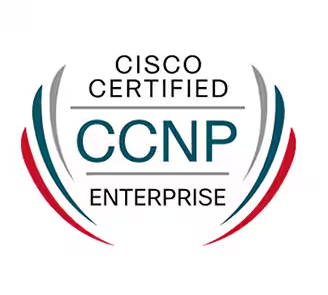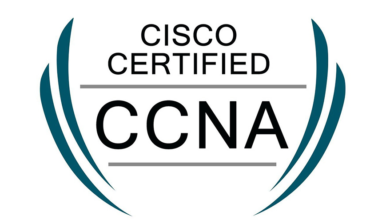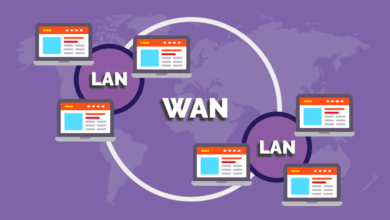What Is Cisco CCNP? Networking Certification

Are you ready to elevate your networking career to new heights? The Cisco CCNP certification is your gateway to mastering advanced network technologies and unlocking exceptional career opportunities. In an ever-evolving digital landscape, staying ahead requires more than just foundational knowledge; it demands expertise, precision, and confidence. The Cisco CCNP isn’t just another certification—it’s a testament to your capability to manage and optimize enterprise-level networks. Whether you’re aiming for higher salaries, greater responsibilities, or a distinguished place in the IT world, the Cisco CCNP certification sets you apart. Take control of your future.
Table of Contents
What is the CCNP Certification?

The Cisco CCNP certification, short for Cisco Certified Network Professional, is a prestigious credential tailored for IT professionals seeking to deepen their expertise in networking. It signifies advanced proficiency in designing, deploying, and troubleshooting both local and wide-area enterprise networks. This certification serves as a critical step beyond foundational levels, such as CCNA, pushing professionals to master more complex network infrastructures. The Cisco CCNP program covers a wide spectrum of technologies, including routing, switching, security, and automation. Attaining this certification not only validates your technical abilities but also amplifies your marketability in an increasingly competitive IT landscape.
How Much is the CCNP Exam?
The cost of the Cisco CCNP exam varies depending on the specific concentration chosen, but the investment is a significant one for networking professionals. Typically, the certification requires two exams: a core exam and a concentration exam. Each exam usually costs around $400. Therefore, the total cost for achieving the Cisco CCNP certification generally falls between $800 and $1,200, depending on additional fees, retakes, and regional pricing. While the financial commitment might seem steep, the certification’s value far outweighs the price, often resulting in enhanced career prospects, higher salaries, and a respected professional standing in the world of IT.
Achieving the Cisco CCNP certification is not just a milestone; it’s a testament to your dedication and expertise in the ever-evolving world of networking.
What Salary Could I Earn with the CCNP Certification?
- Earning a Cisco CCNP certification can significantly boost your salary.
- Average annual salaries range between $80,000 and $120,000, depending on factors like experience and location.
- Senior roles, such as network engineers and architects, often command over $130,000 annually.
- High-demand industries and large enterprises typically offer higher compensation for Cisco CCNP certified professionals.
- The certification enhances your marketability and increases earning potential as businesses rely on advanced networking solutions.
What Other Cisco Network Certifications Are There?
| Certification | Description |
| Cisco Certified Network Associate (CCNA) | An entry-level certification that covers the basics of networking, including IP addressing, subnetting, routing, and switching. Ideal for beginners entering the IT field. |
| Cisco Certified Network Professional (CCNP) | A professional-level certification that dives deep into advanced networking topics, including routing, switching, security, automation, and collaboration. Offers specializations in areas like enterprise, security, and data centers. |
| Cisco Certified Internetwork Expert (CCIE) | The most prestigious certification offered by Cisco, focusing on expert-level skills in designing, implementing, and troubleshooting complex enterprise networks. Highly regarded in the industry, with a rigorous exam process that includes a practical lab exam. |
| Cisco Certified CyberOps Associate | A certification designed for cybersecurity professionals, covering security operations, threat detection, incident response, and monitoring. Equips professionals with skills to work in Security Operations Centers (SOCs). |
| Cisco Certified DevNet Associate | Targeted at developers and software professionals working with network automation, APIs, and programmability. It combines software development skills with networking expertise, focusing on automating and managing networks. |
| Cisco Certified Design Professional (CCDP) | A certification focusing on the design and architecture of scalable networks, suitable for professionals who design enterprise network solutions. Involves designing LANs, WANs, and data center networks with advanced technologies like VPNs and QoS. |
| Cisco Certified Security Professional (CCSP) | Specializes in the protection of network infrastructures, covering topics like firewall configurations, VPN security, intrusion prevention, and secure access controls. Ideal for network security professionals managing high-level security systems. |
| Cisco Certified Wireless Professional (CCWP) | Focuses on designing, implementing, and troubleshooting wireless networks, including Wi-Fi, mobility, and wireless security, to ensure robust and reliable wireless infrastructures. |
| Cisco Certified Collaboration Professional (CCCP) | A certification aimed at professionals managing Cisco collaboration solutions, including voice, video, messaging, and conferencing technologies. Essential for those involved in unified communications and collaboration tools. |
What’s on the CCNP Exam?
1- Core Exam
The core exam focuses on broad enterprise networking topics, assessing foundational and advanced skills required to manage large-scale networks. Key areas include:
- Network Infrastructure: Topics cover routing, switching, and network design.
- Virtualization: Understanding virtual network components and their integration within physical infrastructure.
- Security: Configuring and managing network security protocols, firewalls, and VPNs.
- Automation: Working with network automation frameworks and tools, including programmability through APIs.
- Architecture: Designing scalable, reliable, and efficient networks using best practices.
2- Concentration Exam
The concentration exam allows candidates to specialize in a particular area of interest, offering flexibility in certification paths. Some options include:
- Enterprise Routing and Switching: Advanced knowledge in protocols like OSPF, BGP, and EIGRP.
- Network Security: Focuses on securing networks, including firewalls, VPNs, and intrusion detection.
- Wireless Networking: Covers deploying, managing, and troubleshooting wireless solutions.
- Collaboration: Concentrates on unified communications, including voice, video, and messaging systems.
- Data Center: Focuses on networking, storage, and compute infrastructure in data center environments.
3- Format
Each exam consists of multiple-choice questions, drag-and-drop scenarios, and simulations. The core exam must be passed first, followed by a concentration exam tailored to the candidate’s career goals.
How to Get the CCNP Certification
- Choose Your Path: Decide which Cisco CCNP track best aligns with your career goals and interests. Cisco offers various concentrations, including Enterprise, Security, Data Center, Collaboration, and more. Each track has specific focus areas, so understanding the job roles associated with each concentration can help guide your decision.
- Meet Prerequisites: While there are no strict prerequisites for the CCNP certification, it is highly recommended to hold a foundational certification like the CCNA (Cisco Certified Network Associate). This ensures you have the necessary foundational knowledge and skills in networking concepts.
- Study Core Topics: Begin your preparation by studying the core exam topics. Familiarize yourself with subjects such as:
- Network Infrastructure: Deep dive into routing and switching protocols, network topologies, and architecture.Virtualization: Learn about virtual networks, software-defined networking (SDN), and network function virtualization (NFV).Security: Understand the implementation and management of security protocols, firewalls, intrusion prevention systems (IPS), and VPNs.Automation: Explore network automation tools, scripting languages, and APIs to enhance operational efficiency.
- Engage in Hands-On Practice: Practical experience is crucial. Set up lab environments using simulators like Cisco Packet Tracer or GNS3, or utilize real Cisco hardware if available. Engage in hands-on exercises that involve configuring routers and switches, implementing security measures, and troubleshooting common network issues.
- Utilize Practice Exams: Take advantage of practice exams to gauge your understanding of the material and familiarize yourself with the exam format. Many online platforms offer practice tests that simulate the actual exam environment, helping to build your confidence.
- Schedule Your Exams: Once you feel prepared, register for the core exam through Cisco’s testing partner, Pearson VUE. Make sure to check the exam details, including topics covered, duration, and scoring criteria. Select a convenient date and location for your exam.
- Prepare for Each Exam: Follow a structured study plan leading up to the exam date. Revisit complex topics and dedicate time to practice labs. Joining study groups or online forums can provide additional insights and support from peers preparing for the same certification.
- Pass the Core Exam: Successfully completing the core exam is the first milestone on your path to Cisco CCNP certification. This exam tests your comprehensive knowledge and ability to apply advanced networking concepts in real-world scenarios.
- Choose a Concentration: After passing the core exam, select a concentration exam that aligns with your interests, such as enterprise routing and switching, security, wireless networking, or collaboration. Each concentration focuses on specialized topics and skills.
- Achieve Certification: Prepare diligently for your chosen concentration exam, utilizing similar study techniques and hands-on practice. Once you pass both the core and concentration exams, you will earn your Cisco CCNP certification. This achievement validates your advanced networking expertise and significantly enhances your career prospects in the IT industry.
With a Cisco CCNP certification, you don’t just gain knowledge—you unlock doors to advanced career opportunities and higher earning potential.
Conclusion
In conclusion, obtaining the Cisco CCNP certification is a pivotal step for networking professionals seeking to advance their careers. This esteemed credential not only validates advanced technical expertise but also opens the door to lucrative job opportunities and higher earning potential. As the demand for skilled network professionals continues to grow, the Cisco CCNP distinguishes you in a competitive landscape, enhancing your marketability. Embracing this certification signifies a commitment to excellence and a proactive approach to staying ahead in the ever-evolving field of technology. Invest in your future—let the Cisco CCNP propel your career to new heights.
The Cisco CCNP distinguishes you in the competitive IT landscape, marking your commitment to excellence and proficiency in complex network solutions.
FAQ about Cisco CCNP Certification
- What is the Cisco CCNP certification?
The Cisco CCNP certification is an advanced networking credential that validates a professional’s ability to manage and troubleshoot complex network infrastructures. - What are the prerequisites for obtaining the Cisco CCNP certification?
While there are no formal prerequisites, it is highly recommended to hold a CCNA certification to ensure foundational knowledge in networking concepts. - How many exams are required for the Cisco CCNP certification?
The Cisco CCNP certification requires passing one core exam and one concentration exam, allowing candidates to specialize in areas of interest. - What topics are covered in the Cisco CCNP exam?
The Cisco CCNP exam covers a range of topics, including network infrastructure, security, automation, and virtualization, depending on the concentration chosen. - How much does the Cisco CCNP certification cost?
The total cost for the Cisco CCNP certification typically ranges from $800 to $1,200, depending on exam fees and additional study materials. - What salary can I expect with a Cisco CCNP certification?
Professionals with a Cisco CCNP certification can expect to earn between $80,000 and $120,000 annually, with the potential for higher salaries in senior roles. - How long is the Cisco CCNP certification valid?
The Cisco CCNP certification is valid for three years. To maintain certification, professionals must pass a recertification exam or earn continuing education credits. - Where can I find study materials for the Cisco CCNP certification?
Study materials for the Cisco CCNP certification can be found through Cisco’s official website, online courses, textbooks, and practice exams offered by various providers.




